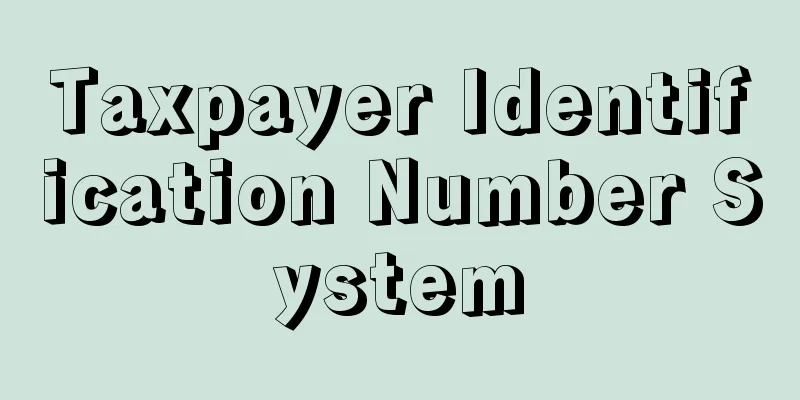Taxpayer Identification Number System

|
A system in which all taxpayers are given a unique number and are required to use it in economic transactions and tax returns to the tax authorities, so that the tax authorities can centrally manage the tax documents of each taxpayer. The purpose of the system is to accurately capture the income of individuals and companies, to tax fairly, and to streamline tax administration. The tax authorities use computer processing to match the taxpayer's tax return and the tax return submitted by the other party to the transaction based on the taxpayer ID number, compare the contents, and judge the appropriateness of the contents of the return. The United States has used the Social Security Number since 1962, and Canada has used the Social Insurance Number since 1967 for tax purposes, while Sweden, Denmark, Finland, and the Republic of Korea (Korea) in Northern Europe have used the resident registration number for tax purposes since the 1960s. In the United Kingdom, the National Insurance Number is used only for some tax purposes, such as withholding tax. Italy has used the Taxpayer ID Number since 1977, Australia since 1989, and Germany since 2009. In Japan, the introduction of the system has been considered since around 1980 by the Tax System Research Council and other organizations, and the relevant law for the Social Security and Tax Number System (My Number System), which includes use in social security and disaster prevention measures, was enacted in 2013. There are concerns about the strengthening of state control and the invasion of privacy due to the leaking of personal information regarding the assignment of numbers to citizens and their centralized management. Source: Encyclopaedia Britannica Concise Encyclopedia About Encyclopaedia Britannica Concise Encyclopedia Information |
|
すべての納税者に一意の番号を付与し,経済取引や税務当局への申告における利用を義務づけることで,税務当局が各納税者の課税資料を集中的に管理する制度。個人や企業などの所得を正確に捕捉して公平に課税することや,税務行政を効率化することなどを目的とする。付番機関が納税者に番号を交付するとともに税務当局に番号データを提供し,税務当局は納税者から提出される申告書と取り引きの相手方から提出される申告書を納税者番号に基づいてコンピュータ処理で名寄せし,記載内容を突き合わせて,申告書の内容の適否を判断する。アメリカ合衆国は 1962年から社会保障番号を,カナダは 1967年から社会保険番号を税務に活用しており,北ヨーロッパのスウェーデン,デンマーク,フィンランドや大韓民国(韓国)は 1960年代から住民登録番号を税務に用いている。またイギリスでは源泉徴収など一部の税務にかぎって国民保険番号が使われている。納税者番号は,1977年からイタリア,1989年からオーストラリア,2009年からドイツが利用している。日本でも 1980年頃から税制調査会などで導入が検討され始め,2013年に社会保障と災害対策での利用も含めた社会保障・税番号制度(マイナンバー制度)の関連法が成立した。国民に番号を付与し一元管理することについては,国家による統制の強化や,個人情報の漏洩によるプライバシーの侵害なども懸念されている。
出典 ブリタニカ国際大百科事典 小項目事典ブリタニカ国際大百科事典 小項目事典について 情報 |
<<: Complete agricultural policy guide
Recommend
Christian Culture - Christian Culture
A general term for the culture that was introduced...
Major scale (English)
A heptonic scale with a major third as the third ...
horse
…Nishina Shinmei Shrine is also horizontal, but t...
Aichi River
A river in eastern Shiga Prefecture. The Chaya Riv...
Farrer, W.
… In 1879, the first ship equipped with meat refr...
Gravity casting
…[Takateru Umeda]. . … *Some of the terminology u...
Prism (English spelling) prism
A transparent body with two or more smooth, unifor...
Sect Shinto - Kyoha Shinto
A general term for the Shinto religious groups th...
Quinoline
A heterocyclic compound containing a nitrogen ato...
"Uwanari Nue Yorimasa"
...A style of Kabuki and Ningyo-Joruri. Uwanari m...
Nunobikimaru Incident
An incident in July 1899 in which an attempt was m...
Sirmin
A casting aluminum alloy containing silicon. Alpha...
Arrhenius's ionization theory - Arrhenius's ionization theory
...Solutions of substances called electrolytes no...
Diffusion annealing - Diffusion annealing
...This process therefore takes a relatively long...
Kyoka Four Heavenly Kings - Kyoka Tennou
…His works, Genchu Yoteki and Gagen Shuran, are...









